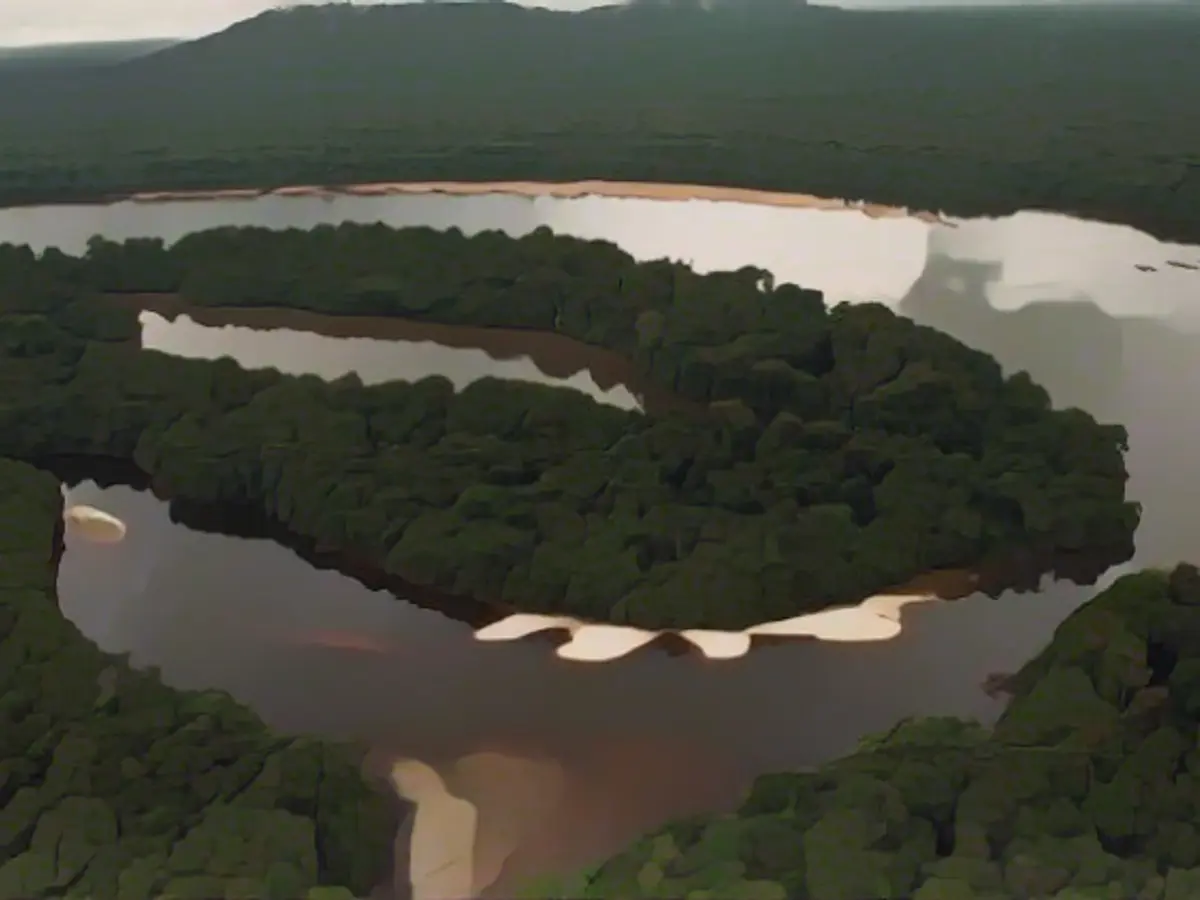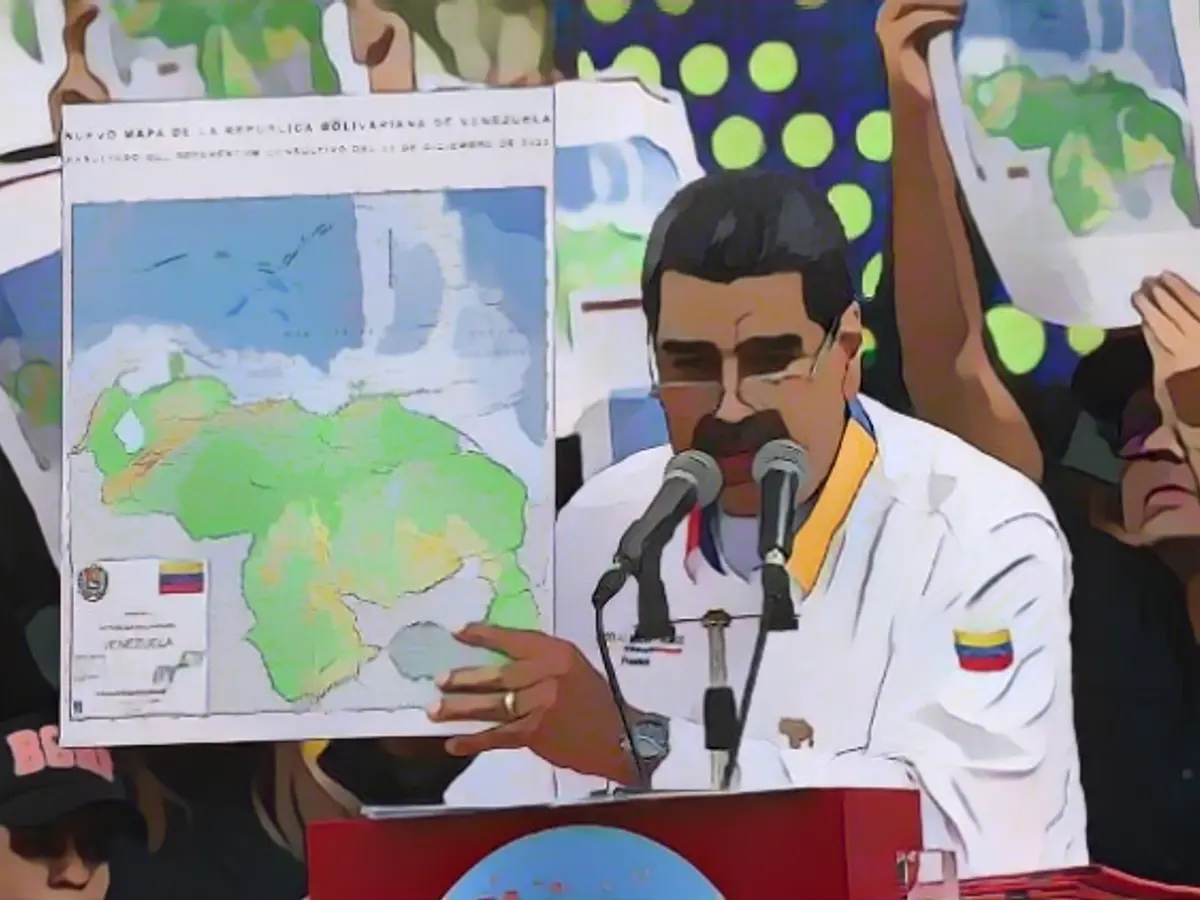Jungle warfare in Guyana? "That would be Vietnam to the power of three"
After Venezuela's annexation referendum, the world fears the next war, but the situation has calmed down in the meantime. A battle in the rainforest would not be winnable for anyone anyway, says a local expert.
Memories of Russia and the annexation of Crimea nine years ago come to mind when the President of Venezuela, Nicolás Maduro, celebrates the result of a bizarre referendum two weeks ago. Venezuela laid claim to the majority of its neighboring country Guyana. 95 percent voted in the referendum for Venezuela to annex the Essequibo region in Guyana.
Head of state Maduro speaks of a victory for his country. The Venezuelan people had "spoken hard, loud and clear". That is why they are now "entering a new, powerful phase". Venezuela's president is calling for the area to be made a province of Venezuela by law and for licenses to be issued for oil production.
Guyana, on the other hand, denounces the vote as an "existential threat". The country in the north of South America is one of the smallest on the continent - but not tiny by European standards, only slightly smaller than Great Britain. However, Venezuela lays claim to almost two thirds of the country's territory - a region roughly twice the size of Austria.
"The region is not called Eldorado for fun"
The Essequibo region stretches from the Atlantic coast in the northwest of Guyana to deep south on the border with Brazil. Christian Cwik, a historian at the University of Graz's Center for Inter-American Studies, knows that it is an area rich in natural resources. The Austrian is well connected in South America and has spent years researching in the region. "Of course, it's about the new natural gas and oil discoveries off the coast of Guyana. But in reality, it's also about diamonds, gold, bauxite and uranium. These raw materials are all hidden in the region, which is not called Eldorado just for fun," reports the expert in the ntv podcast "Wieder was gelernt".
Venezuela and Guyana are "in constant dispute" over Essequibo, says Cwik. "It is marked as a claimed area on practically all Venezuelan maps." Nobody in the region itself is therefore surprised by Venezuela's move.
"There is no more impassable terrain"
After a good two weeks of verbal sabre-rattling, tensions have now eased again. Last week, Presidents Maduro and Irfaan Ali met on neutral ground in the Caribbean state of St. Vincent and the Grenadines. Afterwards, they issued a joint declaration stating that violence must be renounced and the conflict should be resolved in accordance with international law. Venezuela and Guyana also want to set up a commission.
This all sounds as if the conflict is freezing again. Local experts such as Christian Cwik are not surprised. The Austrian had already made it clear in advance that he considers a military intervention to be very unlikely. A conquest of the rainforest-rich Eldorado is "actually impossible", said Cwik in the podcast. "It is very dense and partly still primary rainforest. There is no more impassable terrain than this area."
"Venezuela's perspective is not entirely wrong"
Venezuela derives its claim to Essequibo from the Geneva Agreement of 1966. At that time, Venezuela and Great Britain signed a border treaty - just before the former British colony of Guyana declared independence.
Previously, an agreement from 1899 had been in force. In the years that followed, however, Venezuela accused the court of having ruled biasedly in favor of British Guyana. London and Caracas declared the 1899 agreement null and void with the Geneva Agreement. "From a neutral point of view, this is already a controversial issue. Venezuela's perspective is not entirely wrong. Frankly, there has been a lot of shenanigans on the part of the British. They have tried to extend the territory as far as possible in their favor," Cwik analyzes in "Something learned again".
However, the Geneva Agreement from the 1960s ultimately did not provide a promising solution. The border dispute was frozen a few years later.
Economic and domestic political reasons

Venezuela's perspective on the arbitration court may be "not entirely wrong", says Cwik. However, apart from agreements that are over 100 years old, which Caracas is upset about, Venezuela's actions have an economic background above all. In 2015, huge oil reserves were discovered off the Atlantic coast of Guyana. Since then, Guyana has been the country with the highest economic growth in the world. Venezuela's state oil company has - unsurprisingly - not been granted any exploration rights and Caracas also feels "challenged by this", analyzes Cwik.
The referendum on annexation was not only intended to strengthen Venezuela's position vis-à-vis Guyana. Maduro is also concerned with improving his domestic political situation, said Guyana's Prime Minister Mark Philipps in an interview with Die Welt. The ruler had "reached the low point of his popularity" and was therefore "looking for a way to get people back on his side." Creating an enemy of the people? Instructions on how to do this can be found on one of the first pages of any autocrat's handbook.
USA could intervene
Guyana's President Ali said after the annexation referendum that his country was preparing "for the worst-case scenario". The Guyanese government has therefore primarily strengthened its contacts with the USA, reports political scientist Aaron Tauss from the University of Vienna on ntv. "The Guyanese vice president has said that all options are on the table and that the Guyanese would under no circumstances allow Venezuela to annex this territory."
A few days after the referendum, the US military launched its air force over Guyana to underline its support for the country. This measure may also have played a part in averting an escalation for the time being.
Should Venezuela decide one day, contrary to expectations, to advance militarily, the United States would come back into play. "I can well imagine that the US would be willing to defend its interests, as it has often done in Latin America. Up to and including military intervention. But the UK would of course also like to perform a kind of protective power function," analyzes Cwik in the podcast. "But this is pure jungle warfare. It's Vietnam to the power of three. I doubt whether anyone would really go in there."
Read also:
- Year of climate records: extreme is the new normal
- Precautionary arrests show Islamist terror threat
- UN vote urges Israel to ceasefire
- SPD rules out budget resolution before the end of the year
- The Essequibo region in Guyana, rich in natural resources such as oil, natural gas, diamonds, and gold, has become a point of dispute between Venezuela and Guyana due to Venezuela's claim to a majority of Guyana's territory based on the Geneva Agreement of 1966.
- The discovery of large oil reserves off the coast of Guyana in 2015 has further exacerbated tensions between the two countries, as Venezuela's state oil company has not been granted exploration rights.
- Guyana, a small country in South America, is turning to its political allies, including the USA, for support, and the US military has shown its support by launching its air force over Guyana.
- The economic and domestic political motivations behind Venezuela's actions are complicated, with President Nicolás Maduro looking to strengthen his position domestically and lay claim to valuable resources.
- Despite the potential for a volatile situation, local experts such as Christian Cwik from the University of Graz's Center for Inter-American Studies believe that a military intervention in the dense and impassable Eldorado rainforest is unlikely.
- The border dispute between Venezuela and Guyana over the Essequibo region has yet to be resolved, and the potential for escalation remains a concern for both countries and their allies.
Source: www.ntv.de








